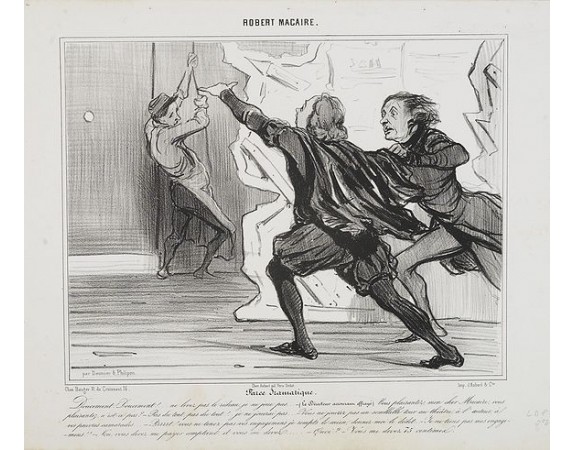DAUMIER, H. - Robert Macaire. Farce dramatique. Doucement ! Doucement !…
 Click on image to zoom
Click on image to zoom

Description
Second state. Translation in English of text title: Dramatic farce. -
Gently! Gently!? Do not raise the curtain, I am not playing -(the
frightened Director rushing towards him). You must be joking, my dear
Macaire, you must be joking? - Not at all, not at all! I will not play. -
You will not play a similar trick to the theatre, to the author, to
your poor colleagues? - Brrrrt! you are not honoring your engagements,
so I have all the right to break mine, give me the leave! - I do not
hold my engagements??
- No, you must pay me cash and you owe me!! - What? - You owe me 75 centimes.
ALBUM.
1840/41 an “Album Robert Macaire 2ème série” was published containing
all 20 prints of this series. The editors were Philipon and Aubert.
Robert
Macaire may seem to be a realistic figure, however one should remember
that in reality he is an artificial personality, created in 1823 by
Benjamin Antier for his play "L’Auberge des Adrets". The breakthrough
came in 1834, when Frédéric Lemaitre used the names of Macaire and his
somewhat simple partner Serres-Bertrand for his various comedies in
Paris. The figure of Macaire goes back as far as 1371, when - as the
legend goes - Aubri de Montdidier, a nobleman from the court of Charles V
was assassinated by Macaire.
The murder was vindicated by his dog,
the only witness of the assassination. A duel between the dog and
Macaire, who was armed with a cudgel, should settle the case. The dog
killed Macaire, who confessed the murder before he died. Macaire
personified the clever business man, who was willing at any time to
throw moral and ethical principles overboard for a quick buck. His
personality fitted exactly to the period so well described by Alexis de
Tocqueville: self-enrichment at all levels and a Government run on
shareholders principles. Short-selling, pyramid systems, investments in
Californian gold mines and IPOs of non existent companies were the name
of the game. Thanks to Macaire and Bertrand, all the little tricks were
demonstrated in detail to the public.
The financial aspects between
artists and the director of the theatre can at best be described as
highly unusual. On June 28, 1843 the Charivari published the following
comments: “What a bizarre world, what contrasts, what a mix up of
existences of theses pariahs of civilization. What a life of nomads, and
what daily misery… Daumier shows us all this with his drawing pencil.
One will find all the remains of upper society, classes and positions:
the intellectual as well as the dog sheerer, the former wholesale trader
as well as the political refugee, a prefect of the Empire as well as
the clothes salesman. It’s this unusual mixture of hopes and incidents
which are thriving to reach their fulfillment in Paris. Furthermore, a
very spirited and strong hand is leading these people helping them to
pull the basis of today’s societies without constraints to the open.” As
one can see in these prints, Daumier is frequently touched by the
poverty, ridicule and dependence of the artist… quite often a Hamlet or
Agamemnon will go to bed with just a piece of bread for dinner.
As the story goes, the director of a theatre in that period paid his leading actor very well, while the understudy received no salary at all or even had to pay for the privilege of acting. Most of the actors had a very insecure existence. Pretty young ladies who were using the stage as a stepping-stone for a position in society as a matter of rule had to pay for the chance to appear on stage.
- Reference N°: 17396
